Scuba Diving For Beginners
‘Rome wasn’t built in a day, and the art of scuba diving is no different. Venturing into the underwater world can be both thrilling and daunting for beginners.
However, with the right mindset and preparation, this activity offers a gateway to unparalleled experiences and discoveries. From mastering essential skills to encountering mesmerizing marine life, the journey of a novice diver is filled with endless possibilities.
So, why not take the plunge and explore the depths in search of adventure and wonder?’
Key Points
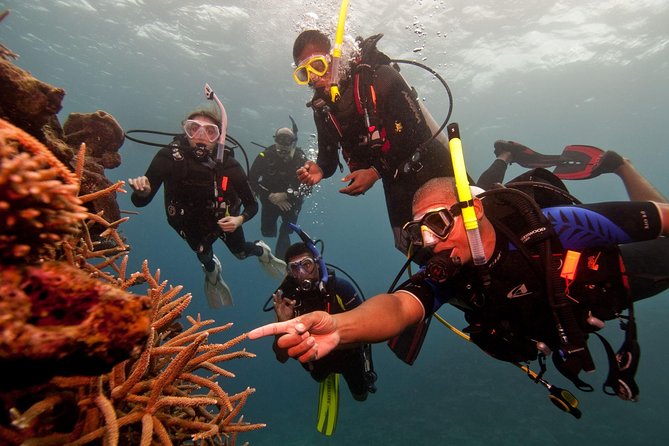
- Explore marine life closely with improved health and flexibility.
- Invest in quality gear, maintain it, and prioritize safety.
- Choose dive locations wisely and conduct basic skills training.
- Embrace the dive buddy system, check gear, and practice essential skills.
Here's some more nearby activities we've reviewed
Benefits of Scuba Diving
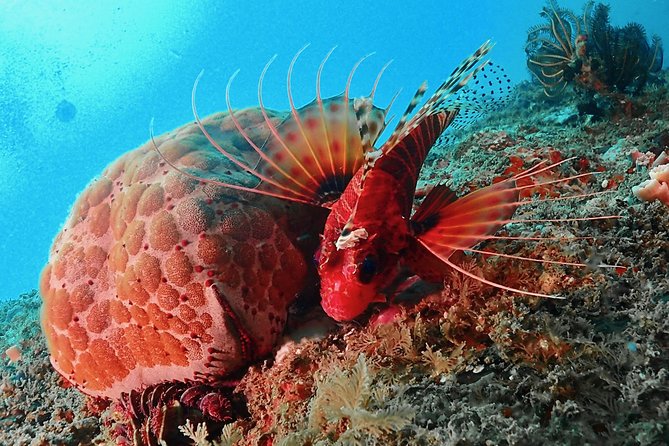
Delving into the underwater world through scuba diving offers a unique opportunity to explore marine life up close and personal. Beyond the sheer enjoyment, scuba diving provides numerous health benefits. The activity is an excellent way to improve cardiovascular health, strengthen muscles, and enhance flexibility.
The underwater environment promotes relaxation, reducing stress levels and improving mental well-being. Plus, learning to scuba dive comes with a manageable learning curve. While it requires training and practice to master the necessary skills, beginners can quickly grasp the basics with the guidance of certified instructors.
The learning process itself can be exhilarating, as each new skill acquired opens up a world of underwater exploration.
Essential Gear for Beginners
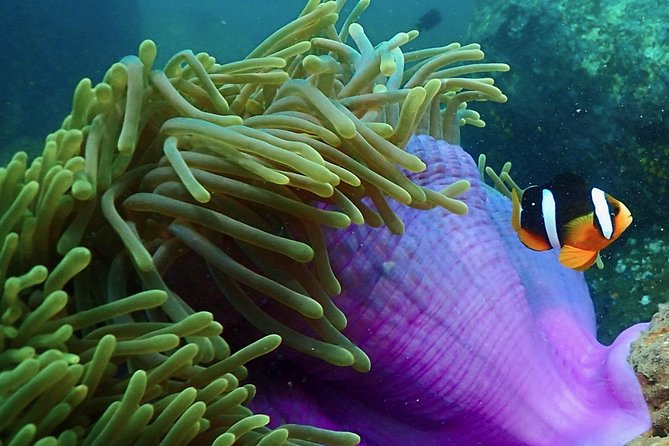
Beginners venturing into scuba diving will find that having the right essential gear is crucial for a safe and enjoyable underwater experience. Proper equipment such as a mask, snorkel, fins, wetsuit, buoyancy control device (BCD), regulator, and dive computer are fundamental for a successful dive.
It’s advisable to invest in quality gear to ensure durability and performance. Beginners should also learn about gear maintenance to prolong the lifespan of their equipment and ensure it functions optimally.
While some divers opt to purchase their gear, beginners can initially consider equipment rental from dive shops or centers. Renting gear allows beginners to try different brands and types before committing to their own set, providing a cost-effective way to explore preferences and needs.
Safety Tips for Novice Divers
For novice divers embarking on their underwater adventures, understanding and adhering to essential safety tips is paramount for a secure and enjoyable scuba diving experience. When venturing into the depths, the dive buddy system ensures mutual assistance in case of emergencies. Safety precautions like checking equipment before diving and never holding your breath are crucial. Familiarizing oneself with emergency procedures such as how to ascend slowly in case of air supply issues is vital for a safe dive. Regular equipment maintenance guarantees reliability underwater. Here is a handy reference table to keep these safety tips in mind:
| Safety Tips | Description |
|---|---|
| Dive Buddy System | Partner up for mutual aid |
| Safety Precautions | Check equipment, avoid holding breath |
| Emergency Procedures | Practice controlled ascents in case of issues |
| Equipment Maintenance | Regularly check gear for optimal functioning |
Choosing the Right Dive Location
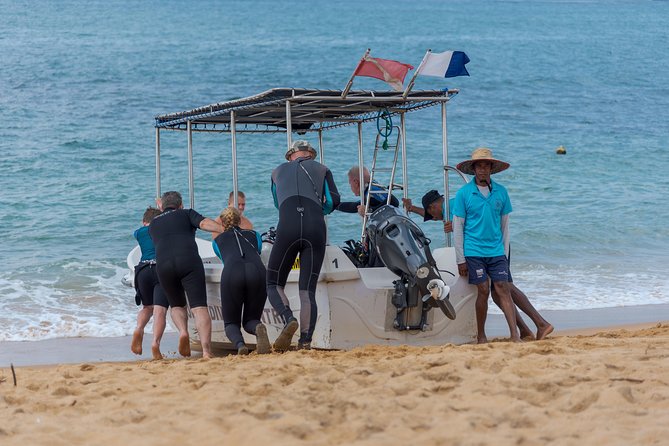
Choosing the right dive location plays a crucial role in ensuring a memorable and safe scuba diving experience for enthusiasts of all skill levels. Dive site selection is essential to consider factors like water visibility, marine life, and currents. Beginners should opt for calm, shallow waters with easy entry and exit points to build confidence.
It’s also vital to ensure equipment maintenance to prevent malfunctions underwater. Checking gear before each dive and following proper care guidelines are key. Researching potential dive locations, reading reviews, and consulting with local dive shops can help in making an informed decision.
Basic Skills Training Overview
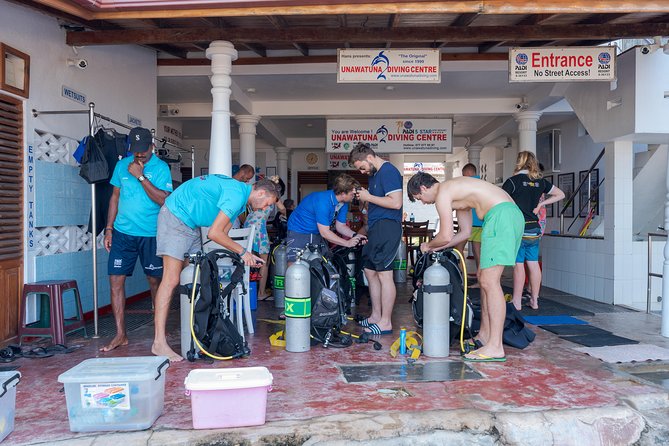
In preparing for scuba diving, mastering basic skills is essential for a safe and enjoyable underwater experience. Here are some key aspects to focus on during basic skills training:
-
Equalization Techniques: Learning how to equalize pressure in your ears and sinuses is crucial to prevent discomfort and injury underwater.
-
Breathing Control: Proper breathing techniques help conserve air and promote relaxation during the dive.
-
Buoyancy Control: Understanding how to maintain neutral buoyancy allows for smooth movement and conservation of energy.
-
Equipment Familiarization: Getting acquainted with your gear ensures you can use it confidently and troubleshoot if needed.
-
Underwater Photography Tips: Capturing memories underwater requires knowledge of lighting, framing, and camera settings to get the best shots.
Understanding Dive Signals and Communication
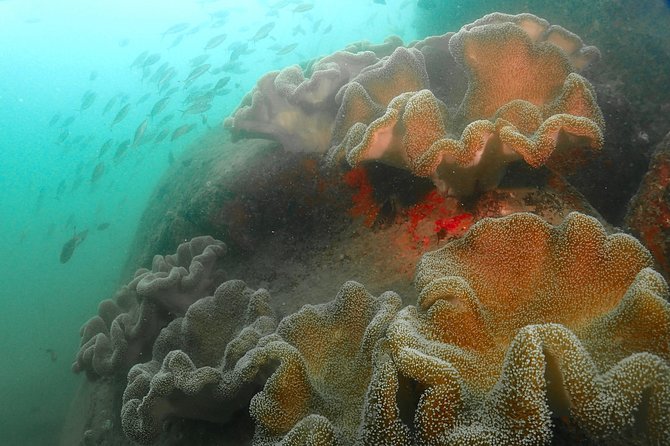
Understanding dive signals and communication plays a vital role in ensuring safety and coordination among scuba divers underwater. Dive signal etiquette is crucial for effective underwater communication.
Divers use hand signals to convey messages such as ‘okay,’ ‘stop,’ or ‘ascend.’ It’s essential to learn and follow these signals to communicate clearly with your dive buddy and group. Communication techniques like using a dive slate or underwater writing board can also aid in conveying messages when hand signals aren’t sufficient.
Maintaining eye contact, pointing out marine life, and practicing pre-dive briefings are additional ways to enhance communication underwater. By mastering dive signals and communication techniques, divers can ensure a safe and enjoyable diving experience.
Marine Life Encounters for Beginners
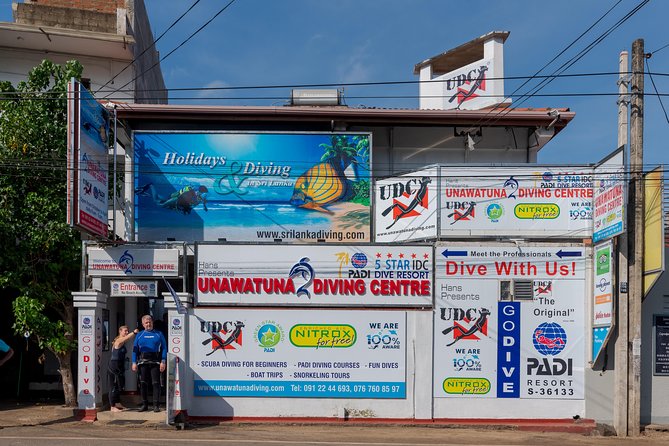
Set out on an exciting journey into the underwater world with thrilling Marine Life Encounters tailored for beginners. Discover the wonders of the ocean while contributing to marine conservation efforts.
-
Underwater Photography: Capture mesmerizing moments and vibrant marine life with underwater photography.
-
Marine Conservation: Learn about the importance of preserving marine ecosystems and how divers can actively participate.
-
Diving Certifications: Acquire necessary diving certifications to explore dive travel destinations safely.
-
Dive Travel Destinations: Explore a variety of stunning dive travel destinations around the world perfect for beginners.
-
Guided Tours: Opt for guided tours led by experienced professionals to enhance your marine life encounters.
Post-Dive Care and Maintenance
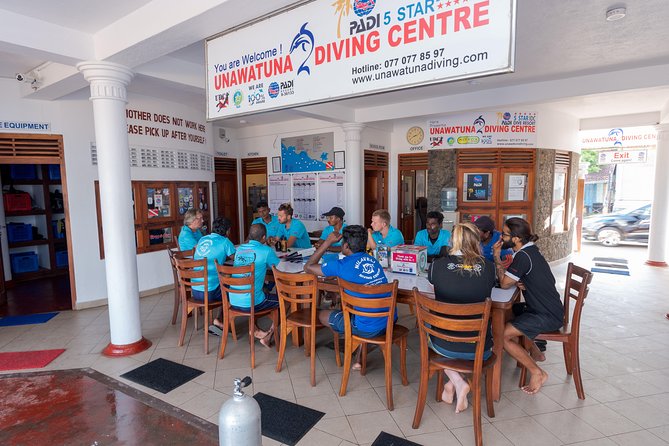
Proper maintenance and care after a scuba dive are crucial for ensuring equipment longevity and diver safety. After a thrilling underwater adventure, it’s essential to clean and store your gear correctly to prevent damage and ensure it’s ready for the next dive. Plus, maintaining good relations with your dive buddy is key to safe and enjoyable diving experiences. Check out the table below for some essential post-dive care tips:
| Equipment Maintenance | Dive Buddy Relations |
|---|---|
| Rinse gear with fresh water | Communicate effectively |
| Dry equipment thoroughly | Respect each other’s boundaries |
| Inspect for damage or wear | Plan dives together |
| Store in a cool, dry place | Discuss emergency procedures |
| Follow manufacturer’s maintenance guidelines | Provide assistance when needed |
Here's a few more nearby tours and experiences we have reviewed.
Common questions
Can I Wear Contact Lenses or Glasses While Scuba Diving?
Wearing contact lenses or glasses while scuba diving can be challenging due to the pressure underwater. Water activities like scuba diving require clear vision, so it’s recommended to use a prescription mask for eye correction while swimming.
Are There Any Age Restrictions for Scuba Diving for Beginners?
Age restrictions for scuba diving vary depending on the location and training agency. Beginners typically need to be at least 10-12 years old. Proper scuba equipment, certification, and understanding the underwater environment are crucial for safe diving experiences.
What Should I Do if I Feel Claustrophobic Underwater While Scuba Diving?
If feeling claustrophobic underwater while scuba diving, one should focus on controlled breathing techniques to prevent a panic response. Slow, deep breaths and mindful relaxation can help manage the situation effectively, ensuring a safe dive experience.
How Do I Know if I Am Physically Fit Enough to Scuba Dive as a Beginner?
To determine fitness for scuba diving, individuals must undergo a thorough fitness assessment. Understanding the physical demands of scuba gear, the importance of a dive buddy, and being familiar with emergency procedures are crucial steps for beginners.
Is Scuba Diving Safe for People With Medical Conditions Like Asthma or High Blood Pressure?
When considering scuba diving for individuals with medical conditions like asthma or high blood pressure, it is crucial to prioritize safety. Diving equipment must be used correctly, safety precautions followed, and underwater communication skills honed to ensure a secure experience.
Here's more of our most recent tour reviews happening neaby
- Wilpattu National Park Safari Tour From Negombo
- Boat Riding in Negombo
- From Katunayake Airport: 8-Day Beauty of Sri Lanka Tour
- Private Transfer From Airport (Bia) to Bentota by Car
- Dining Boat in Negombo
- Negombo: Exploration Tour by Tuk-Tuk!
- Night Diving in Negombo
- Wake Boarding in Negombo
- Snorkeling in Negombo
- From Negombo: Dambulla Caves & Kaudulla National Park Safari
- From Negombo: Bentota Water Sports and Galle City Tour
Last Words
Set out on a scuba diving adventure for beginners at Unawatuna beach in Galle and discover the beauty of the underwater world. With essential gear, safety tips, and expert guidance, this experience promises an unforgettable journey beneath the waves.
Explore vibrant marine life, learn basic skills, and learn about a world of wonder. Dive into a new passion and create memories that will last a lifetime.
Don’t miss out on this thrilling opportunity to explore the depths of the ocean.